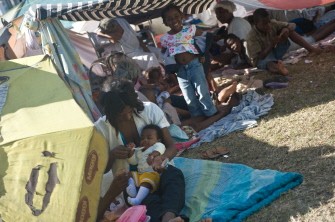Almost 48 hours after the shattered concrete ceiling of her cousin's dress store crashed down upon her, Maryse's faltering cries galvanised a crowd of rescuers digging through the rubble.

Young men -- bystanders and volunteers -- began to scrabble ineffectually at the twisted but still massive net of concrete chunks and steel reinforcement rods trapping Maryse and the corpses of her friends and neighbors.
International aid flights had begun to arrive at Port-au-Prince's airport, but on Thursday, two days after Haiti's most disastrous earthquake, most citizens of its devastated capital could rely on no-one but themselves.
Signs of life from Maryse and at least one more young woman spurred a group of volunteers to action in one city center street, but without heavy lifting gear and trained rescue teams they had little hope of success.
"They're going to die. They're going to die," spat 30-year-old accountancy student Jean Rald Rocher, fiddling with the paper face mask that was his only protective gear as he dug for rotting corpses under reinforced concrete.
Rocher's cousin, Ruth Esperance, was killed in the quake, and now he works with the disorganized gangs of young men hunting through the rubble.
He and others howled with impotent rage as four-by-four trucks with diplomats and aid workers rode past without stopping, neither to help free Maryse nor to gather up the rotting body of her friend, Line Louis-Pierre.
According to the owner of the house that plunged into the store, 52-year-old teacher Domeck Mathurin, at least three more women and girls lay dead in the wreckage and AFP reporters at the scene heard faint cries.
It's the tragedy of one street, in a ruined city where every street has its own row of fly-blown corpses and crowds of wandering refugees, seeking a place to lie down for the night with their few remaining possessions.
The International Red Cross said the quake has killed between 40,000 and 50,000 people, while Haitian officials have warned the overall death toll may top 100,000.
As of late Thursday about 7,000 bodies had already been buried in mass graves, according to Peruvian Prime Minister Velasquez Quesquen, who is in Port-au-Prince supervising Peru's relief effort and met with Haitian President Rene Preval.
Haiti is often cited as the western hemisphere's poorest country, but even amid such misery there were pockets of relative wealth. These neighborhoods, with their multi-story concrete blocks, were hit hard.
A nursing training school a few blocks from international embassies now resembles a truncated pyramid of concrete slabs, twisted steel rods and the bloated bodies of at least a dozen student nurses.
Some of them had time to huddle in each other's arms for protection as the five-story block pancaked on top of them.
Most of their bodies now lie obscenely twisted and exposed, but on the roadside a carefully manicured hand pokes out from under a sheet, a flash of red nail varnish amid the grey dust and blackened, decaying flesh.
One of the nurses continued to cry under the rubble for a day after the earthquake, witnesses said, but none survived and their bodies lay unclaimed amid family photos and meticulously annotated lecture notes.
Perhaps the manicured hand belongs to Floride Beauchamp, whose "Peasants' birth certificate" lies nearby, recording how she was brought into the world by her mother Suzela Beauchamp, a farmer, on March 15, 1989.
Dozens more certificates and diplomas litter the stinking debris.
"We've lost our identity. I don't exist," raged Antoine Rene, a 35-year-old accountant, whose entire life and official documents were lost in his ruined home and who was leading his wife away to seek shelter with relatives.
Many Haitians are angry at their own government's slow response -- "We have no authorities," snorted Rene's wife -- and when they see foreign reporters they demand to know when the international community will come to their aid.
But the state has not been entirely absent. A single, immaculate red fire engine lumbered around the central district north of the presidential palace doing what it could to help the volunteer rescuers.
Summoned by local police, they intervened to put out a blaze in an abandoned general store that had threatened to spread to the modest home of 83-year-old Ludovic Jean, who cannot remember any disaster to compare to the quake.
One of the firefighters had to face tragedy of his own, however. His engine was called to his own house, where the dust-coated feet of his daughter Nadeje and her friend Maxo were found limply entwined under rubble.
Staring at her solemn face on her identity card, he blinked back tears and brushed away a reporter. "Don't you worry about it," he said, before heading back out to the next ruined home.
Three streets away, Maryse started to cry out. Faintly.
























